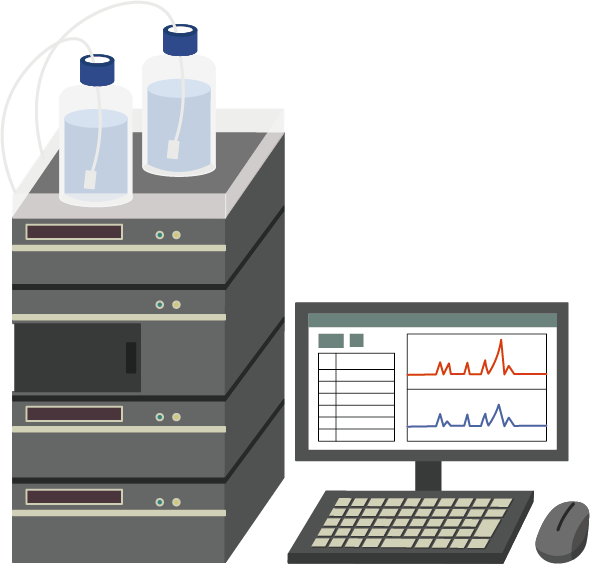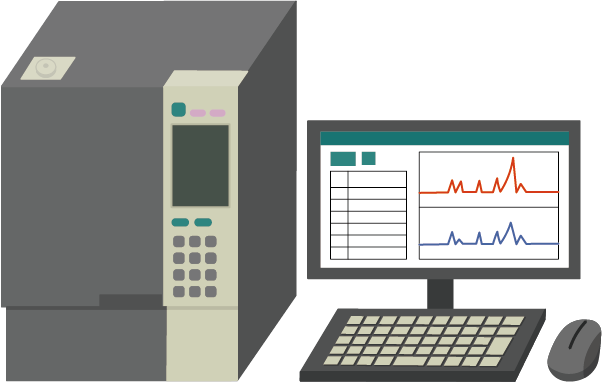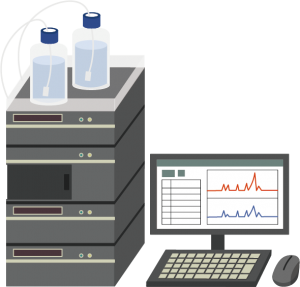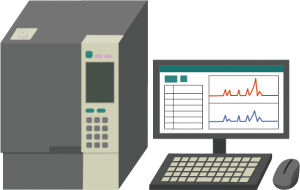Functional Mushroom Testing
Functional Mushroom Potency Testing
Turnaround time: 48 hours
Altitude Consulting uses liquid chromatography to test the potency of the most common compounds found in functional mushrooms. Utilize this testing to validate efficiency of extraction methods or verify the potency of your final products. With the use of the latest HPLC-DAD technology and software we ensure the most accurate results.
Instrument Used
High Performance Liquid Chromatography (HPLC)

Panels:
Lion's Mane Panel
Showcase the high quality and rich compound content of your Lion’s Mane products, boosting customer trust effortlessly.
Compounds Covered
- Adenine (hemisulfate)
- Adenosine
- Erinacine A
- Hypoxanthine
Reishi Panel
Highlight the premium quality and potent active ingredients in your Reishi products, enhancing customer confidence with ease.
Compounds Covered
- Adenine (hemisulfate)
- Adenosine
- Ganoderic Acid A
- Hypoxanthine
Cordycep Panel
Validate the quality of your cordyceps extracts and products, securing consumer trust with proven results.
Compounds Covered
- Adenine (hemisulfate)
- Adenosine
- Cordycepin
- Hypoxanthine
Blend Panel
Showcase the unique synergy of mushrooms in your blend, ensuring your customers receive the benefits that they are after.
Compounds Covered
- Adenine (hemisulfate)
- Adenosine
- Cordycepin
- Erinacine A
- Ganoderic Acid A
- Hypoxanthine
Minimum sample size:
Biomass: 1g
All other samples: 0.5g
Potency Testing
Turnaround time: 48 hours
Altitude Consulting uses liquid chromatography to test the potency of the most common compounds found in functional mushrooms. Utilize this testing to validate efficiency of extraction methods or verify the potency of your final products. With the use of the latest HPLC-DAD technology and software we ensure the most accurate results.
High Performance Liquid Chromatography (HPLC)
Panels
Lion's Mane Panel
Compounds covered
- Adenine (hemisulfate)
- Adenosine
- Erinacine A
- Hypoxanthine
Reishi Panel
Compounds covered
- Adenine (hemisulfate)
- Adenosine
- Ganoderic Acid A
- Hypoxanthine
CORDYCEP PANEL
Compounds covered
- Adenine (hemisulfate)
- Adenosine
- Cordycepin
- Hypoxanthine
Blend Panel
Compounds covered
- Adenine (hemisulfate)
- Adenosine
- Cordycepin
- Erinacine A
- Ganoderic Acid A
- Hypoxanthine
Minimum sample sizes:
Biomass: 1g
All other samples: 0.5g
Residual Solvents Testing
Turnaround time: 48 hours
Altitude Consulting uses GC-MS Headspace to test for 19 common solvents used for extraction and cleaning in the food & mushroom industry. GC-MS technology gives us the ability to identify unknown hits.
Compounds Covered:
- 2-methylbutane
- Acetone
- Acetonitrile
- Benzene
- Butane
- Ethanol
- Ethylbenzene
- Isobutane
- Isopropanol
- M+P xylene
- Methanol
- N-Heptane
- N-hexane
- N-pentane
- O-xylene
- Propane
- Tetrahydrofuran
- Toluene
Instrument Used:
Gas Chromatography—Mass Spectrometry (GC-MS) Headspace

Residual Solvents Testing
Turnaround time: 48 hours
Altitude Consulting uses GC-MS Headspace to test for 19 common solvents used for extraction and cleaning in the mushroom industry. GC-MS technology gives us the ability to identify unknown hits.
- 2-methylbutane
- Acetone
- Acetonitrile
- Benzene
- Butane
- Ethanol
- Ethylbenzene
- Isobutane
- Isopropanol
- M+P xylene
- Methanol
- N-Heptane
- N-hexane
- N-pentane
- O-xylene
- Propane
- Tetrahydrofuran
- Toluene
Gas Chromatography—Mass Spectrometry (GC-MS) Headspace
Heavy Metals Testing
Turnaround time: 1-2 Weeks
Heavy metals tend to be toxic to humans at even very low concentrations. Unfortunately, there are not regulations in the US preventing these compounds from ending up in supplement products. Regardless, safe supplements should not contain heavy metals. We offer testing for the four metals whose absence is required in other industries, which are lead (Pb), arsenic (As), cadmium (Cd) and mercury (Hg).
Compounds Covered:
- Arsenic (Ar)
- Cadmium (Cd)
- Lead (Pb)
- Mercury (Hg)
Instrument Used:
Inductively Coupled Plasma Mass Spectrometry (ICP-MS)

Heavy Metals Testing
Turnaround time: 1-2 Weeks
Heavy metals tend to be toxic to humans at even very low concentrations. Unfortunately, there are not regulations in the US preventing these compounds from ending up in supplement products. Regardless, safe supplements should not contain heavy metals. We offer testing for the four metals whose absence is required in other industries, which are lead (Pb), arsenic (As), cadmium (Cd) and mercury (Hg).
- Arsenic (Ar)
- Cadmium (Cd)
- Lead (Pb)
- Mercury (Hg)
Inductively Coupled Plasma Mass Spectrometry (ICP-MS)
Pesticides Testing
Turnaround time: 1-2 Weeks
Pesticides are often used to help keep mushrooms growing strong and rid them of pesky pests. Unfortunately, just as much as they help keep mushrooms alive, they harm humans. There are no regulations on pesticides being present in the supplement industry, but their absence should be guaranteed for consumer’s safety. We’ve worked with AB Sciex to develop a method to detect over 50 different pesticides to ensure that your products are safe.
Instrument Used:
Gas Chromatography—Mass Spectrometry Triple Quadrupole (GC-MS-MS)

Compounds Covered:
- Abamectin
- Acephate
- Acequinocyl
- Acetamiprid
- Azoxystrobin
- Bifenazate
- Bifenthrin
- Boscalid
- Carbofuran
- Chlorantraniliprole
- Chlorpyrifos
- Chlorfenapyr
- Clofentezine
- Cyfluthrin
- Cypermethrin (technical)
- Daminozide
- Diazinon
- Dichlorvos
- Dimethoate
- Ethoprophos
- Etofenprox
- Etoxazole
- Fenoxycarb
- Fenpyroximate
- Fipronil
- Flonicamid
- Fludioxonil
- Hexythiazox
- Imazalil
- Imidacloprid
- Kresoxim-methyl
- Malathion
- Metalaxyl
- Methiocarb
- Methomyl
- MGK 264
- Myclobutanil
- Naled
- Oxamyl
- Paclobutrazol
- Parathion-methyl
- Permethrin
- Phosmet
- Piperonyl butoxide
- Prallethrin
- Propiconazole
- Propoxur
- Pyrethrins
- Pyridaben
- Spinosad
- Spiromesifen
- Spirotetramat
- Spiroxamine
- Tebuconazole
- Thiacloprid
- Thiamethoxam
- Trifloxystrobin
Minimum sample size:
Biomass: 2g
All other samples: 1g
Pesticides Testing
Turnaround time: 1-2 Weeks
Pesticides are often used to help keep mushrooms growing strong and rid them of pesky pests. Unfortunately, just as much as they help keep mushrooms alive, they harm humans. There are no regulations on pesticides being present in the supplement industry, but their absence should be guaranteed for consumer’s safety. We’ve worked with AB Sciex to develop a method to detect over 50 different pesticides to ensure that your products are safe.
- Abamectin
- Acephate
- Acequinocyl
- Acetamiprid
- Azoxystrobin
- Bifenazate
- Bifenthrin
- Boscalid
- Carbofuran
- Chlorantraniliprole
- Chlorpyrifos
- Chlorfenapyr
- Clofentezine
- Cyfluthrin
- Cypermethrin (technical)
- Daminozide
- Diazinon
- Dichlorvos
- Dimethoate
- Ethoprophos
- Etofenprox
- Etoxazole
- Fenoxycarb
- Fenpyroximate
- Fipronil
- Flonicamid
- Fludioxonil
- Hexythiazox
- Imazalil
- Imidacloprid
- Kresoxim-methyl
- Malathion
- Metalaxyl
- Methiocarb
- Methomyl
- MGK 264
- Myclobutanil
- Naled
- Oxamyl
- Paclobutrazol
- Parathion-methyl
- Permethrin
- Phosmet
- Piperonyl butoxide
- Prallethrin
- Propiconazole
- Propoxur
- Pyrethrins
- Pyridaben
- Spinosad
- Spiromesifen
- Spirotetramat
- Spiroxamine
- Tebuconazole
- Thiacloprid
- Thiamethoxam
- Trifloxystrobin
Gas Chromatography—Mass Spectrometry Triple Quadrupole (GC-MS-MS)
Minimum sample sizes:
Biomass: 2g
All other samples: 1g
Microbials Testing
Turnaround time: 1-2 Weeks
Microbials testing is a cornerstone of both mushroom growth and product production. Given that mushrooms are so suspect to contamination due to their growing environments, testing for microbials can be useful for more than final product testing. Verifying that there is no invisible contamination before processing helps to guarantee that it will not begin to flourish during processing.
Compounds Covered:
- Salmonella
- Total Coliform
- Aspergillus
- E. coli
- Yeast
- Mold
Instrument Used:
Thermal Cycler—Fluorometer used for Quantitative Polymerase Chain Reaction (qPCR)

Microbials Testing
Turnaround time: 1-2 Weeks
Microbials testing is a cornerstone of both mushroom growth and product production. Given that mushrooms are so suspect to contamination due to their growing environments, testing for microbials can be useful for more than final product testing. Verifying that there is no invisible contamination before processing helps to guarantee that it will not begin to flourish during processing.
- Salmonella
- Total Coliform
- Aspergillus
- E. coli
- Yeast
- Mold
Thermal Cycler—Fluorometer used for Quantitative Polymerase Chain Reaction (qPCR)
Common questions

Functional mushrooms are mushrooms that have been studied and documented to provide particular health benefits. Unlike traditional mushrooms, functional mushrooms are specifically cultivated to be consumed as a dietary supplement because of their nutrient-rich, medicinal properties. Typically dried into powder form, these mushrooms are shown to support the body’s general wellbeing, with some promising but ongoing research suggesting that they may help in treating specific ailments or diseases. It is important to note that consuming functional mushrooms is generally considered safe; however, checking with your doctor before adding them to your diet may be a wise choice.
Functional mushrooms provide our bodies with essential compounds to assist in maintaining homeostasis. These mushrooms contain inflammation-fighting compounds such as Beta-D-Glucans, Lentinan, and Ergosterol which help keep inflammation at bay. Additionally, mushrooms produce host defense peptides that work like antibiotics to help our body’s immune system fight off infections. Mushrooms are rich in Vitamin D, Calcium, Iron, Selenium, and more – all essential minerals that can improve our body’s overall health. Recently research has also shown how certain mushroom species such as Chaga, Reishi, Turkey Tail can help modulate inflammation response and so far have seen good results when used in combination with traditional treatments. As with any supplement regimen it is best to seek advice of a medical professional before starting any treatment.
Functional mushrooms are a unique and powerful dietary supplement. These mushrooms come with a range of potential health benefits, ranging from enhanced immune system function to improved cognitive performance. They may also help to regulate hormones, reduce inflammation, and promote heart health. And, as a natural source of vitamins, minerals and enzymes, functional mushrooms can be part of an overall healthy diet. For this reason, many people are looking to incorporate functional mushrooms into their regular diets as part of an effort to maintain good health and prevent disease.
Functional mushrooms are a type of mushroom that contain several compounds which provide health-promoting benefits. Some of these compounds include cordycepin, adenosine and uridine. Cordycepin is known to improve bodily energy, as well as improve blood flow and provide anti-inflammatory effects. Adenosine has been associated with improved brain functions like memory, learning and cognition. Lastly, uridine has been found to have properties that regulate mood.

